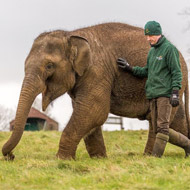
Vets treat three-year-old Tarli for Endotheliotropic herpes virus
An Asian elephant has beaten the odds to survive an Ebola-like virus which is fatal in 80 per cent of recorded cases.
Elephant endotheliotropic herpesvirus (EEHV) is a highly fatal disease that weakens the circulatory system in young elephants leading to rapid deterioration.
In November 2017, keepers at Woburn Safari Park carried out a routine blood test on three-year-old Tarli, which revealed that she had EEHV infection. Although she did not have any clinical signs, vets began treatment immediately to give her the best chance of survival.
Treatment for EEHV is mostly supportive, focussing on maintaining bodily function while the immune system fights the disease. A two-week course of antiviral and transfusions was combined with 24-hour supervision from keepers who had cared for Tarli since she was born.
“EEHV is an awful virus, targeting the youngest members of the herd. As keepers we spend more time with our animals than our families and all of us are so relieved at how positively Tarli has responded to treatment,” said Darren Fellowes, Woburn’s head elephant keeper.
The keepers focussed on keeping Tarli calm so that she could remain with the rest of the herd and keep to her usual routine. In a press release, Woburn Safari Park said that the use of intravenous ganciclovir and plasma has had a successful outcome and ‘opens the door to offering alternative treatment protocols’.
It has now been six weeks since Tarli received the all-clear. However, there is still a chance of relapse. The team are cautiously celebrating her recovery whilst they continue to monitor her closely.
Woburn Safari Park raises money for International Elephant Foundation which invests in elephant conservation and research, including for an EEHV vaccine.
“EEHV is the most serious medical threat to the survival of Asian elephant calves. Every case builds on the experience of others, and the body of research around earlier cases allowed us to create an effective treatment programme for Tarli, and ultimately saved her life,” explained specialist vet Nathalie Wissink-Argilaga who led Tarli’s treatment.
“Details of Tarli’s recovery are being shared with the international veterinary community and we hope to share lessons on the value of swift treatment, stress-reduction, continuous monitoring of viral loads and blood parameters and intravenous administration of antivirals and plasma.”
Image (C) Woburn Safari Park



 The latest
The latest